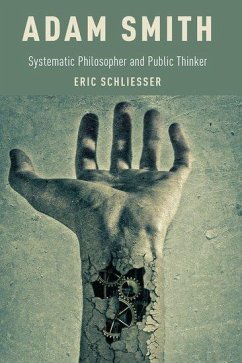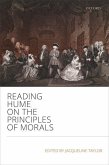- Broschiertes Buch
- Merkliste
- Auf die Merkliste
- Bewerten Bewerten
- Teilen
- Produkt teilen
- Produkterinnerung
- Produkterinnerung
Adam Smith was a famous economist and moral philosopher. This book treats Smith also as a systematic philosopher with a distinct epistemology, an original theory of the passions, and a surprising philosophy mind. The book argues that there is a close, moral connection between Smith's systematic thought and his policy recommendations.
Andere Kunden interessierten sich auch für
![Adam Smith (1723-1790) Adam Smith (1723-1790)]() James FarrerAdam Smith (1723-1790)9,99 €
James FarrerAdam Smith (1723-1790)9,99 €![Jean-Jacques Rousseau and Adam Smith Jean-Jacques Rousseau and Adam Smith]() Charles L GriswoldJean-Jacques Rousseau and Adam Smith66,99 €
Charles L GriswoldJean-Jacques Rousseau and Adam Smith66,99 €![FILOSOFÍA MORAL DE ADAM SMITH FILOSOFÍA MORAL DE ADAM SMITH]() FILOSOFÍA MORAL DE ADAM SMITH15,99 €
FILOSOFÍA MORAL DE ADAM SMITH15,99 €![El infiel y el profesor : David Hume y Adam Smith : la amistad que forjó el pensamiento moderno El infiel y el profesor : David Hume y Adam Smith : la amistad que forjó el pensamiento moderno]() Dennis Carl RasmussenEl infiel y el profesor : David Hume y Adam Smith : la amistad que forjó el pensamiento moderno24,99 €
Dennis Carl RasmussenEl infiel y el profesor : David Hume y Adam Smith : la amistad que forjó el pensamiento moderno24,99 €![Reading Hume on the Principles of Morals Reading Hume on the Principles of Morals]() Reading Hume on the Principles of Morals47,99 €
Reading Hume on the Principles of Morals47,99 €![Adam Ferguson and the Idea of Civil Society Adam Ferguson and the Idea of Civil Society]() Craig SmithAdam Ferguson and the Idea of Civil Society32,99 €
Craig SmithAdam Ferguson and the Idea of Civil Society32,99 €![Adam Smith's Political Philosophy Adam Smith's Political Philosophy]() Craig SmithAdam Smith's Political Philosophy74,99 €
Craig SmithAdam Smith's Political Philosophy74,99 €-
-
-
Adam Smith was a famous economist and moral philosopher. This book treats Smith also as a systematic philosopher with a distinct epistemology, an original theory of the passions, and a surprising philosophy mind. The book argues that there is a close, moral connection between Smith's systematic thought and his policy recommendations.
Hinweis: Dieser Artikel kann nur an eine deutsche Lieferadresse ausgeliefert werden.
Hinweis: Dieser Artikel kann nur an eine deutsche Lieferadresse ausgeliefert werden.
Produktdetails
- Produktdetails
- Verlag: Oxford University Press
- Seitenzahl: 434
- Erscheinungstermin: 1. Oktober 2019
- Englisch
- Abmessung: 231mm x 155mm x 28mm
- Gewicht: 658g
- ISBN-13: 9780190088798
- ISBN-10: 0190088796
- Artikelnr.: 57358099
- Herstellerkennzeichnung
- Libri GmbH
- Europaallee 1
- 36244 Bad Hersfeld
- gpsr@libri.de
- Verlag: Oxford University Press
- Seitenzahl: 434
- Erscheinungstermin: 1. Oktober 2019
- Englisch
- Abmessung: 231mm x 155mm x 28mm
- Gewicht: 658g
- ISBN-13: 9780190088798
- ISBN-10: 0190088796
- Artikelnr.: 57358099
- Herstellerkennzeichnung
- Libri GmbH
- Europaallee 1
- 36244 Bad Hersfeld
- gpsr@libri.de
Eric Schliesser (PhD, 2002, The University of Chicago) teaches political theory at The University of Amsterdam since 2015. He has published widely on early modern philosophy and sciences, including political economy as well as recent philosophy of economics. His edited volumes include Sympathy: A History, The Oxford Handbook of Isaac Newton, Ten Neglected Classics of Philosophy (all with Oxford University Press). This is his first monograph. He is editor of The Oxford Handbook of Newton (forthcoming, OUP), Ten Neglected Classics of Philosophy (2016, OUP), and Sympathy: A History (2015, OUP).
* Acknowledgments
* List of abbreviations
* Bibliographic note
* 1. Introduction: Systematic Philosopher and Public Philosopher
* a. Systems in Adam Smith
* b. Smith's Corpus as Two Systems of Philosophy
* c. A Bibliographical Interlude
* d. Methodological Remarks
* e. Brief Summary
* Part 1. Propensities and Passions
* 2. Passionate Human Nature
* a. Human Propensities and Smithian Social Explanation
* b. Mind, Language, and Society
* 3. The Passions, Rationality, and Reason
* a. Natural Passions
* b. Proto-Passions, or Preconceptions and why Smith is not an
Empiricist
* c. Causation, Sound Judgment, and Environmental Rationality
* d. Reason as an Active Principle
* e. Natural unexpected passions: the intellectual sentiments.
* f. Derived Passions
* 4. From Natural Sentiments to General Rules and Moral Sentiments
* a. Natural Sentiments
* i. Smith's criticisms of Hume's account of Property
* ii. The Natural Sentiments and General Rules
* b. Moral Faculties; the moral Sense and conscience
* 5. The Sympathetic Process and Judgments of Propriety
* a. Sympathetic process (feelings)
* b. Sympathy and Knowledge of Causal Relations
* c. Judgments of Proportionality
* d. Counterfactual reasoning in the Sympathetic Process
* e. The Piacular, or On Seeing Oneself as a Moral Cause in Adam Smith
* i. We (Ought to) See Ourselves as Causes!
* ii. Norms of Appeasement, or on experts and Smith's Embrace of
Fortune
* iii. Superstition and Grandeur
* iv. Natural Sentiments and Enlightenment, or Nature vs Reason
* f. The Impartial Spectator
* Part 2: Society
* 6. Society and Political Taxonomy: Individuals, Classes, Factions,
Nations, and Governments
* 7. Adam Smith's Foundations for Political Philosophy
* a. "A New Utopia"
* b. Even the Humane Smith
* c. Belonging to Society
* i. The Genealogy of Property
* ii. Original and Derived Property
* iii. The Turn to History: the Enlightenment Imperative
* 8. Institutions and Social Consequentialism
* a. Society, Justice, and group-Selection
* b. Utility and Social Institutions
* c. The Measure of Real Price: Adam Smith's Science of Equity
* d. Progressive Taxation
* e. On Theoretical Partiality Toward the Working Poor
* f. The role of the legislator; private virtue, public happiness.
* g. Liberty
* h. Regulating Markets
* 9. Virtue
* a. Virtue as Excellence or Virtue in Common Life?
* b. Excellent-in-Virtue-of Character
* 10. Three Invisible Hands
* a. The Invisible Hand of Jupiter, and Miracles.
* b. The "Vain and Insatiable Desires" of the Rich
* c. Promoting Unintended Ends in WN
* d. Comparing the three Invisible Hands.
* 11. Philosophy of Science
* a. Philosophy Within the Division of Labor
* b. Social Epistemology and the Impartial Spectator
* c. Copernicus and Newton: Modest Scientific Realism
* d. Magnanimous Superstition
* 12. The Methodology of Wealth of Nations
* a. Reflexivity
* b. Natural and Market Prices
* c. Deviations from Nature, "The Price of Free Competition"
* i. Newton's Fourth Rule of Reasoning
* ii. Descartes and Kepler's Irregularities
* d. The Role of Institutions
* e. Model, Cause, Process; Smithian Social Explanation
* f. Hume vs. Smith on the Introduction of Commerce
* g. Hume's Natural Rate of Propagation and Smith's Digression on
Silver
* 13. Smith and Anti-Mathematicism
* a. Adam Smith's Newtonianism Reconsidered
* b. The Road to True Philosophy
* c. Anti-mathematicism and Proportionality in Hume and Smith
* d. Adam Smith and Proportions (as well as good judgment)
* Part 3: Philosophers
* 14. Religion
* a. Biblical Revelation and Christian Theology
* b. Anti-Clericalism and Freedom of Religion
* 15. A Cheerful Philosophical Life
* a. The Commercial Philosopher
* b. Hume's exchange with Charon
* c. Friendship, Sincerity, and Real Happiness
* Part 4: Conclusion
* 16. Conclusion
* Bibliography
* Index
* List of abbreviations
* Bibliographic note
* 1. Introduction: Systematic Philosopher and Public Philosopher
* a. Systems in Adam Smith
* b. Smith's Corpus as Two Systems of Philosophy
* c. A Bibliographical Interlude
* d. Methodological Remarks
* e. Brief Summary
* Part 1. Propensities and Passions
* 2. Passionate Human Nature
* a. Human Propensities and Smithian Social Explanation
* b. Mind, Language, and Society
* 3. The Passions, Rationality, and Reason
* a. Natural Passions
* b. Proto-Passions, or Preconceptions and why Smith is not an
Empiricist
* c. Causation, Sound Judgment, and Environmental Rationality
* d. Reason as an Active Principle
* e. Natural unexpected passions: the intellectual sentiments.
* f. Derived Passions
* 4. From Natural Sentiments to General Rules and Moral Sentiments
* a. Natural Sentiments
* i. Smith's criticisms of Hume's account of Property
* ii. The Natural Sentiments and General Rules
* b. Moral Faculties; the moral Sense and conscience
* 5. The Sympathetic Process and Judgments of Propriety
* a. Sympathetic process (feelings)
* b. Sympathy and Knowledge of Causal Relations
* c. Judgments of Proportionality
* d. Counterfactual reasoning in the Sympathetic Process
* e. The Piacular, or On Seeing Oneself as a Moral Cause in Adam Smith
* i. We (Ought to) See Ourselves as Causes!
* ii. Norms of Appeasement, or on experts and Smith's Embrace of
Fortune
* iii. Superstition and Grandeur
* iv. Natural Sentiments and Enlightenment, or Nature vs Reason
* f. The Impartial Spectator
* Part 2: Society
* 6. Society and Political Taxonomy: Individuals, Classes, Factions,
Nations, and Governments
* 7. Adam Smith's Foundations for Political Philosophy
* a. "A New Utopia"
* b. Even the Humane Smith
* c. Belonging to Society
* i. The Genealogy of Property
* ii. Original and Derived Property
* iii. The Turn to History: the Enlightenment Imperative
* 8. Institutions and Social Consequentialism
* a. Society, Justice, and group-Selection
* b. Utility and Social Institutions
* c. The Measure of Real Price: Adam Smith's Science of Equity
* d. Progressive Taxation
* e. On Theoretical Partiality Toward the Working Poor
* f. The role of the legislator; private virtue, public happiness.
* g. Liberty
* h. Regulating Markets
* 9. Virtue
* a. Virtue as Excellence or Virtue in Common Life?
* b. Excellent-in-Virtue-of Character
* 10. Three Invisible Hands
* a. The Invisible Hand of Jupiter, and Miracles.
* b. The "Vain and Insatiable Desires" of the Rich
* c. Promoting Unintended Ends in WN
* d. Comparing the three Invisible Hands.
* 11. Philosophy of Science
* a. Philosophy Within the Division of Labor
* b. Social Epistemology and the Impartial Spectator
* c. Copernicus and Newton: Modest Scientific Realism
* d. Magnanimous Superstition
* 12. The Methodology of Wealth of Nations
* a. Reflexivity
* b. Natural and Market Prices
* c. Deviations from Nature, "The Price of Free Competition"
* i. Newton's Fourth Rule of Reasoning
* ii. Descartes and Kepler's Irregularities
* d. The Role of Institutions
* e. Model, Cause, Process; Smithian Social Explanation
* f. Hume vs. Smith on the Introduction of Commerce
* g. Hume's Natural Rate of Propagation and Smith's Digression on
Silver
* 13. Smith and Anti-Mathematicism
* a. Adam Smith's Newtonianism Reconsidered
* b. The Road to True Philosophy
* c. Anti-mathematicism and Proportionality in Hume and Smith
* d. Adam Smith and Proportions (as well as good judgment)
* Part 3: Philosophers
* 14. Religion
* a. Biblical Revelation and Christian Theology
* b. Anti-Clericalism and Freedom of Religion
* 15. A Cheerful Philosophical Life
* a. The Commercial Philosopher
* b. Hume's exchange with Charon
* c. Friendship, Sincerity, and Real Happiness
* Part 4: Conclusion
* 16. Conclusion
* Bibliography
* Index
* Acknowledgments
* List of abbreviations
* Bibliographic note
* 1. Introduction: Systematic Philosopher and Public Philosopher
* a. Systems in Adam Smith
* b. Smith's Corpus as Two Systems of Philosophy
* c. A Bibliographical Interlude
* d. Methodological Remarks
* e. Brief Summary
* Part 1. Propensities and Passions
* 2. Passionate Human Nature
* a. Human Propensities and Smithian Social Explanation
* b. Mind, Language, and Society
* 3. The Passions, Rationality, and Reason
* a. Natural Passions
* b. Proto-Passions, or Preconceptions and why Smith is not an
Empiricist
* c. Causation, Sound Judgment, and Environmental Rationality
* d. Reason as an Active Principle
* e. Natural unexpected passions: the intellectual sentiments.
* f. Derived Passions
* 4. From Natural Sentiments to General Rules and Moral Sentiments
* a. Natural Sentiments
* i. Smith's criticisms of Hume's account of Property
* ii. The Natural Sentiments and General Rules
* b. Moral Faculties; the moral Sense and conscience
* 5. The Sympathetic Process and Judgments of Propriety
* a. Sympathetic process (feelings)
* b. Sympathy and Knowledge of Causal Relations
* c. Judgments of Proportionality
* d. Counterfactual reasoning in the Sympathetic Process
* e. The Piacular, or On Seeing Oneself as a Moral Cause in Adam Smith
* i. We (Ought to) See Ourselves as Causes!
* ii. Norms of Appeasement, or on experts and Smith's Embrace of
Fortune
* iii. Superstition and Grandeur
* iv. Natural Sentiments and Enlightenment, or Nature vs Reason
* f. The Impartial Spectator
* Part 2: Society
* 6. Society and Political Taxonomy: Individuals, Classes, Factions,
Nations, and Governments
* 7. Adam Smith's Foundations for Political Philosophy
* a. "A New Utopia"
* b. Even the Humane Smith
* c. Belonging to Society
* i. The Genealogy of Property
* ii. Original and Derived Property
* iii. The Turn to History: the Enlightenment Imperative
* 8. Institutions and Social Consequentialism
* a. Society, Justice, and group-Selection
* b. Utility and Social Institutions
* c. The Measure of Real Price: Adam Smith's Science of Equity
* d. Progressive Taxation
* e. On Theoretical Partiality Toward the Working Poor
* f. The role of the legislator; private virtue, public happiness.
* g. Liberty
* h. Regulating Markets
* 9. Virtue
* a. Virtue as Excellence or Virtue in Common Life?
* b. Excellent-in-Virtue-of Character
* 10. Three Invisible Hands
* a. The Invisible Hand of Jupiter, and Miracles.
* b. The "Vain and Insatiable Desires" of the Rich
* c. Promoting Unintended Ends in WN
* d. Comparing the three Invisible Hands.
* 11. Philosophy of Science
* a. Philosophy Within the Division of Labor
* b. Social Epistemology and the Impartial Spectator
* c. Copernicus and Newton: Modest Scientific Realism
* d. Magnanimous Superstition
* 12. The Methodology of Wealth of Nations
* a. Reflexivity
* b. Natural and Market Prices
* c. Deviations from Nature, "The Price of Free Competition"
* i. Newton's Fourth Rule of Reasoning
* ii. Descartes and Kepler's Irregularities
* d. The Role of Institutions
* e. Model, Cause, Process; Smithian Social Explanation
* f. Hume vs. Smith on the Introduction of Commerce
* g. Hume's Natural Rate of Propagation and Smith's Digression on
Silver
* 13. Smith and Anti-Mathematicism
* a. Adam Smith's Newtonianism Reconsidered
* b. The Road to True Philosophy
* c. Anti-mathematicism and Proportionality in Hume and Smith
* d. Adam Smith and Proportions (as well as good judgment)
* Part 3: Philosophers
* 14. Religion
* a. Biblical Revelation and Christian Theology
* b. Anti-Clericalism and Freedom of Religion
* 15. A Cheerful Philosophical Life
* a. The Commercial Philosopher
* b. Hume's exchange with Charon
* c. Friendship, Sincerity, and Real Happiness
* Part 4: Conclusion
* 16. Conclusion
* Bibliography
* Index
* List of abbreviations
* Bibliographic note
* 1. Introduction: Systematic Philosopher and Public Philosopher
* a. Systems in Adam Smith
* b. Smith's Corpus as Two Systems of Philosophy
* c. A Bibliographical Interlude
* d. Methodological Remarks
* e. Brief Summary
* Part 1. Propensities and Passions
* 2. Passionate Human Nature
* a. Human Propensities and Smithian Social Explanation
* b. Mind, Language, and Society
* 3. The Passions, Rationality, and Reason
* a. Natural Passions
* b. Proto-Passions, or Preconceptions and why Smith is not an
Empiricist
* c. Causation, Sound Judgment, and Environmental Rationality
* d. Reason as an Active Principle
* e. Natural unexpected passions: the intellectual sentiments.
* f. Derived Passions
* 4. From Natural Sentiments to General Rules and Moral Sentiments
* a. Natural Sentiments
* i. Smith's criticisms of Hume's account of Property
* ii. The Natural Sentiments and General Rules
* b. Moral Faculties; the moral Sense and conscience
* 5. The Sympathetic Process and Judgments of Propriety
* a. Sympathetic process (feelings)
* b. Sympathy and Knowledge of Causal Relations
* c. Judgments of Proportionality
* d. Counterfactual reasoning in the Sympathetic Process
* e. The Piacular, or On Seeing Oneself as a Moral Cause in Adam Smith
* i. We (Ought to) See Ourselves as Causes!
* ii. Norms of Appeasement, or on experts and Smith's Embrace of
Fortune
* iii. Superstition and Grandeur
* iv. Natural Sentiments and Enlightenment, or Nature vs Reason
* f. The Impartial Spectator
* Part 2: Society
* 6. Society and Political Taxonomy: Individuals, Classes, Factions,
Nations, and Governments
* 7. Adam Smith's Foundations for Political Philosophy
* a. "A New Utopia"
* b. Even the Humane Smith
* c. Belonging to Society
* i. The Genealogy of Property
* ii. Original and Derived Property
* iii. The Turn to History: the Enlightenment Imperative
* 8. Institutions and Social Consequentialism
* a. Society, Justice, and group-Selection
* b. Utility and Social Institutions
* c. The Measure of Real Price: Adam Smith's Science of Equity
* d. Progressive Taxation
* e. On Theoretical Partiality Toward the Working Poor
* f. The role of the legislator; private virtue, public happiness.
* g. Liberty
* h. Regulating Markets
* 9. Virtue
* a. Virtue as Excellence or Virtue in Common Life?
* b. Excellent-in-Virtue-of Character
* 10. Three Invisible Hands
* a. The Invisible Hand of Jupiter, and Miracles.
* b. The "Vain and Insatiable Desires" of the Rich
* c. Promoting Unintended Ends in WN
* d. Comparing the three Invisible Hands.
* 11. Philosophy of Science
* a. Philosophy Within the Division of Labor
* b. Social Epistemology and the Impartial Spectator
* c. Copernicus and Newton: Modest Scientific Realism
* d. Magnanimous Superstition
* 12. The Methodology of Wealth of Nations
* a. Reflexivity
* b. Natural and Market Prices
* c. Deviations from Nature, "The Price of Free Competition"
* i. Newton's Fourth Rule of Reasoning
* ii. Descartes and Kepler's Irregularities
* d. The Role of Institutions
* e. Model, Cause, Process; Smithian Social Explanation
* f. Hume vs. Smith on the Introduction of Commerce
* g. Hume's Natural Rate of Propagation and Smith's Digression on
Silver
* 13. Smith and Anti-Mathematicism
* a. Adam Smith's Newtonianism Reconsidered
* b. The Road to True Philosophy
* c. Anti-mathematicism and Proportionality in Hume and Smith
* d. Adam Smith and Proportions (as well as good judgment)
* Part 3: Philosophers
* 14. Religion
* a. Biblical Revelation and Christian Theology
* b. Anti-Clericalism and Freedom of Religion
* 15. A Cheerful Philosophical Life
* a. The Commercial Philosopher
* b. Hume's exchange with Charon
* c. Friendship, Sincerity, and Real Happiness
* Part 4: Conclusion
* 16. Conclusion
* Bibliography
* Index








